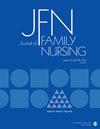Caring for Families of Patients With Acquired Brain Injury Early During Hospitalization: A Feasibility Study of the SAFIR© Intervention
IF 2.6
3区 医学
Q1 FAMILY STUDIES
引用次数: 0
Abstract
This study aimed to assess the feasibility of a complex family nursing intervention (SAFIR©) designed to support families of patients with acquired brain injuries during the early phase of hospitalization, using a one-group pre- and post-test design with a one-month follow-up. Family members participated in four family meetings. Quantitative data were collected using an intervention protocol checklist and questionnaires. Qualitative data were gathered through semi-structured interviews, written open-ended questions, and note-taking. Feasibility outcomes revealed a family recruitment rate of 15.4% and a retention rate of 100%. Protocol adherence ranged from 94% in Phase 1 to 78% in Phase 3. Our results indicated that the intervention was meaningful and suitable for family members (n=7), healthcare provider (n=1), and nursing managers (n=6). From a sustainability perspective, our findings suggest the need to formally involve the entire inter-professional team in the intervention. Further evaluation of the intervention is warranted through a large-scale experimental.住院期间及早照顾后天性脑损伤患者家属:SAFIR© 干预措施的可行性研究
本研究旨在评估复杂家庭护理干预(SAFIR©)的可行性,该干预旨在为后天性脑损伤患者住院初期的家庭提供支持,采用单组前后测试设计,并进行为期一个月的随访。家庭成员参加了四次家庭会议。定量数据通过干预方案核对表和调查问卷收集。定性数据通过半结构化访谈、书面开放式问题和笔记收集。可行性结果显示,家庭招募率为 15.4%,保留率为 100%。协议遵守率从第一阶段的 94% 到第三阶段的 78% 不等。我们的结果表明,该干预措施对家庭成员(7 人)、医疗服务提供者(1 人)和护理管理者(6 人)都很有意义且合适。从可持续发展的角度来看,我们的研究结果表明,有必要让整个跨专业团队正式参与干预。有必要通过大规模实验对干预措施进行进一步评估。
本文章由计算机程序翻译,如有差异,请以英文原文为准。
求助全文
约1分钟内获得全文
求助全文
来源期刊
CiteScore
4.00
自引率
9.70%
发文量
40
审稿时长
>12 weeks
期刊介绍:
Journal of Family Nursing (JFN) is a peer-reviewed, quarterly journal of nursing research, practice, education, and policy issues, as well as empirical and theoretical analyses on the subject of family health. Its interdisciplinary, international, and collaborative perspectives examine cultural diversity and families across the life cycle. This journal is a member of the Committee on Publication Ethics (COPE).

 求助内容:
求助内容: 应助结果提醒方式:
应助结果提醒方式:


